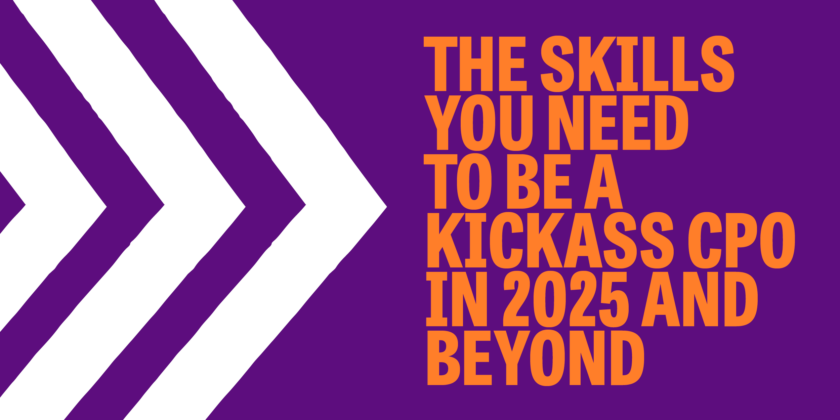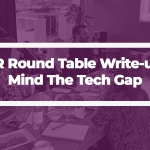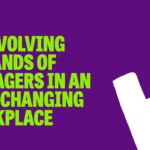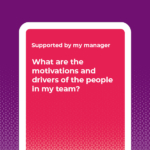In the rapidly evolving landscape of workplace dynamics and organisational culture, the role of a Chief People Officer (CPO) has never been more critical—or more challenging. Gone are the days when people leadership was simply about managing HR processes and compliance – today’s CPOs have to be strategic partners, cultural architects, and visionary leaders who must navigate complex human dynamics, drive employee engagement, and align talent strategies with overarching business objectives.
It can be an overwhelming world to try and navigate, let alone keep up with and ensure you’re at the forefront of! On 14th November, we set out to do just that, and shed some light on a world that can seem daunting and tricky to get a handle on for many people.
We assembled a dream team of HR Directors and People Leaders to answer our attendees’ burning questions:
- Jas Rai, Chief Operating Officer at the British Library
- John Athanasiou, Strategic People Director at People Puzzles
- April Tomlinson, Senior VP of HR at Liverpool FC
- Andy Macdonald, Chief People Officer at IOP Publishing
All of their insights are below and waiting for you – but if you’d prefer to watch the panel discussion as it happened on the day, simply click here to head to our YouTube channel and watch the full recording of the event!
Our top recommendations for skills to master
Jas Rai, COO at the British Library
Being a kick-ass CPO is all about combining strategy with a real people-first approach, especially when unexpected challenges come your way. Moving from CPO to COO has shown me just how critical these skills are, especially in the wake of things like our recent cyber attack.
Here’s what I think makes for a truly effective CPO:
- Strategic HR Know-How: As a CPO, you’re doing more than just setting up a talent strategy—you’re making sure it supports the organisation’s vision. This means creating a comprehensive approach that goes beyond traditional recruitment and performance management. When things like a cyber attack happen, it’s clearer than ever why HR needs to be aligned with the big picture to help the whole organisation stay resilient. Strategic HR is about anticipating potential challenges, developing proactive talent strategies, and ensuring that every people-related decision supports long-term organisational goals. In my COO role, I’ve seen how crucial it is for every department to be on the same page and pushing toward the same long-term objectives.
- Leading Change with People at the Core: Change is happening all the time, and let’s face it, it’s not always easy. I think a great CPO leads change by recognizing the human impact, whether it’s rolling out a flexible working model, managing a restructuring, or helping people through the effects of a crisis. This means being empathetic, communicative, and creating support systems that help employees navigate uncertainty. This has been central to my role as COO—I’m constantly working to make sure that operational changes feel supportive, even in challenging times.
- Agility: In times like these, agility is everything. Our world moves quickly—whether it’s adopting new tech, adapting to employee expectations, or recovering from unexpected events. Being able to pivot quickly has been essential, and it’s taught me that adaptability is a core skill for any CPO. This means being comfortable with uncertainty, quick decision-making, and maintaining a calm and strategic approach even when things seem chaotic. When things get tough, you need to be able to make decisions fast, trust your judgment, and support your people.
- Business Savvy: Understanding the business side of things is essential. This goes beyond just knowing financial metrics—it’s about deeply understanding how people strategies directly impact business outcomes. Being able to connect people strategy with financials and operations keeps us on track, even during crises. As COO, this knowledge is about aligning HR with every function, helping to ensure that all departments are prepared and responsive. In times of crisis, it’s been incredibly helpful to know that each decision we make is not only strategic but sustainable.
- Prioritising Well-being: Especially during times of stress, people need to feel supported. Well-being isn’t just a “nice-to-have”—it’s essential for resilience. This means creating comprehensive well-being programs that address mental, physical, and emotional health, not just during crises but as an ongoing organisational priority. After our recent cyber attack, supporting mental health and well-being has been crucial. People perform their best when they feel secure and valued, and as a CPO, leading with a focus on well-being is fundamental to keeping morale high and the team moving forward.
For anyone wanting to step up as a CPO, I’d say this: prioritise people skills as much as the technical side. Lead with empathy, especially through change, and put well-being first. Stay adaptable because change and challenges aren’t going anywhere. Real leadership is about understanding the people behind the transformation and guiding them through whatever comes your way. That’s where you’ll make the biggest impact.
The key training know-how you need
John Athanasiou, Strategic People Director at People Puzzles
In my time, I’ve learned that the journey to becoming an exceptional Chief People Officer (CPO) is far more nuanced and dynamic than traditional career paths might suggest. Throughout my career, I’ve witnessed firsthand how successful HR leadership transcends academic credentials and requires a multifaceted approach that blends practical experience, business know-how, technological fluency, and an understanding of human potential. The modern CPO is not just an administrator, but a strategic architect of organisational culture, a change catalyst, and a visionary who understands that people are an organisation’s most critical asset.
My top tips when it comes to the training and development opportunities needed to be a kick-ass CPO are:
Prioritise Practical Experience: Real-world problem-solving and crisis management offer lessons no textbook can teach. CPOs who have navigated significant challenges like mergers or culture shifts often demonstrate more robust leadership capabilities than those with purely academic backgrounds. While CIPD qualifications are helpful for initial career progression, they’re increasingly seen as a baseline. Continuous, hands-on learning is what truly sets leaders apart.
Broaden Business Acumen: CPOs should cultivate expertise that extends far beyond traditional HR boundaries. Experience in areas like finance, operations, or marketing provides a holistic business perspective that enables more integrated HR strategies. An MBA in Strategy or business leadership training can often provide more value than HR-specific qualifications. My background in finance and sales taught me to always seek the ROI in HR initiatives—a mindset that’s critical in today’s data-driven business environment, especially when it comes to doing better with less.
Embrace Tech Fluency: With AI and data analytics rapidly transforming the workplace, CPOs must become technologically savvy. This isn’t just about understanding tools, but about leveraging technology to enhance decision-making, streamline processes, and provide strategic insights. AI is here to stay, and it will play an increasingly significant role in the next decade. You need to evolve with the times, and be ready to adapt – or you risk being left behind.
Developing Soft Skills Plus Intelligence Quotients: While AI cannot replace human leadership, developing a multi-dimensional intelligence is crucial. It’s no longer IQ that’s the only measure of your know-how, it’s a mix of the following:
- Emotional Intelligence (EQ): Ability to influence and collaborate with the C-Suite
- Spiritual Intelligence (SQ): Demonstrating compassion and wisdom
- Physical Intelligence (PQ): Understanding the connection between physical health and mental performance
- Adversity Intelligence (AQ): Building resilience and capacity to handle difficult circumstances
- Cultural Intelligence (CQ): Understanding diverse cultures and maintaining an open-minded approach to learning
Always Learning Mindset: Create a culture of psychological safety that encourages continuous learning and feedback. This means practicing transparency, fostering open communication, and building a learning network. Utilize coaching, mentoring, attend conferences, listen to inspirational speakers, and always remain curious about both internal and external perspectives.
Strategy and Change Management: Develop a deep understanding of change leadership. As Simon Sinek emphasizes, always know the “Why” behind your strategies. Familiarize yourself with change management models like Kotter’s 8 Steps, McKinsey’s 7-S Model, and practice forward-thinking techniques like “Back from the Future” approach. Read business books, engage with your Strategy Director, and be prepared to be your own strategy innovator.
The attributes to focus on to be an awesome leader
April Tomlinson, Senior VP at Liverpool FC
I’ve come to understand that the role of a Chief People Officer is far more than a traditional administrative function. It’s a dynamic, challenging position that requires a blend of foresight, accountability, interpersonal skill, and personal resilience. The modern CPO must be part strategist, part psychologist, and part change agent. Success in this role isn’t about maintaining the status quo, but about proactively anticipating change, building genuine relationships, making bold decisions, and maintaining personal well-being while guiding an organisation through inevitable uncertainties.
My top attributes you would need to be the best People Leader you can be are:
Being able to see into the future – No CPO can afford to stand still, and we must keep pace with rapidly evolving workplace dynamics. The multi-generational workforce we now have come with diverse and complex needs, which means we must continuously update our strategies, technologies, and approaches. This isn’t just about trends, but about genuinely understanding and adapting to the changing expectations of different generations in the workplace.
Accountability – Walk the talk, lead by example. This means making decisive decisions and owning their outcomes completely. When things don’t go as planned, have the humility to accept the consequences, learn from the experience, and demonstrate transparency. Nobody is perfect, including us in HR, and acknowledging that is a strength, not a weakness.
Relationship Building – In my business, internal relationships are everything. While many people moving into CPO roles come from a Business Partner background and are typically skilled at relationship management, it’s not universal. Investing time in building genuine, meaningful relationships is key. This goes beyond surface-level networking—it’s about truly understanding stakeholders, their challenges, and how HR can provide strategic value. Work the room outside of the room, engage in meaningful conversations, and recognize that stakeholder management is crucial in getting new initiatives approved and implemented.
Resilience – We need to look after ourselves to ensure we can handle the challenges thrown our way. People look to HR during personal, organisational, and global crises, and sometimes we’re experiencing the same pressures. We must lead by example in demonstrating resilience. This means finding trusted relationships, creating safe spaces to decompress, and actively practicing self-care. I heard at a conference that nearly a quarter (23.2%) of senior HR professionals cited burnout as the main reason for wanting to leave their role. So, learn to prioritize yourself!
The concept of ‘chaos surfing’ has become the new HR superpower. My advice? Don’t try to change the ocean—accept that there will be waves, accept that you will fall off the board, and learn to get back on and grow from the experience.
The vital relationship skills you need as a people leader
Andy Macdonald – Chief People Officer at IOPP
In over 30 years, HR has changed significantly, but one constant remains: the need for strong expertise, credible leadership, and a fundamentally human approach. HR is about people-focused outcomes, and being a CPO means keeping human-centered solutions at the forefront of organisational strategy.
My best pointers for nailing the relationships you’ll have to form, grow, and manage over years to come are:
Be Visible – This isn’t about constant presence, but about spending quality time with executive and senior teams. Practice active listening and maintain a genuine sense of curiosity about their challenges and perspectives.
Do the Right Thing – While following process is important, true leadership sometimes means prioritizing the right outcome over the strictly correct procedure. This approach builds credibility and trust.
Listen to Customers – Prove that you genuinely understand feedback by making tangible changes. This builds strong advocacy and relationships across the organisation.
Be Curious – Strive to know your customers’ business as comprehensively as they do. This depth of understanding is what separates good HR leaders from exceptional ones.
Allies and Challengers – Invest equal time in building relationships with both supportive allies and critical challengers. The latter often become your most powerful advocates.
Pre-Meeting Strategy – What happens in the room is largely determined by the groundwork laid outside of it. Invest time in pre-meeting preparations, especially when critical decisions are needed.
My top tips would be:
- Listen just as much, if not more, than you speak!
- Think of the customer outcome, not the HR process.
- Try replacing the response “No” with “What if” – you’ll be surprised with how many good ideas and plans come out of taking a different perspective!
In conclusion
The insights from our panel of HR experts make one thing crystal clear: being a great Chief People Officer is about so much more than managing HR processes. It’s about strategic thinking, empathy, adaptability, and driving real business value through the people that are at the centre of everything you do and achieve.
If we’ve inspired you today to transform your people strategy and unlock your organisation’s full potential, click here to explore our services and discover how we can help you Get, Keep, and Grow brilliant people in 2025 and beyond.



